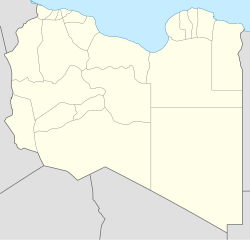| Zliten truck bombing | |
|---|---|
| Part of the Libyan civil war (2014–2020) | |
 | |
| Location | 32°27′50″N14°34′21″E / 32.46389°N 14.57250°E Zliten, Murqub District, Libya |
| Date | 7 January 2016 |
| Target | Policemen |
Attack type | Suicide truck bombing |
| Weapons | Truck bombs |
| Deaths | 60+ |
| Injured | 200+ |
| Perpetrators | Wilayat al-Barqa (ISIL), Abu al-Abbas al-Muhajir, |
The Zliten truck bombing occurred on 7 January 2016, when Islamist militants detonated a truck bomb at the police training camp al-Jahfal in the coastal town of Zliten, Libya. Libyan authorities said at least 60 policemen were killed and over 200 wounded. Concrete buildings inside the compound were charred from the blast and their windows blown out; nearby cars were turned into twisted metal wrecks. The head of the United Nations Support Mission in Libya, Martin Kobler, said the blast was a suicide attack. [1] [2] [3] [4]
Contents
Wilayat al-Barqah, a province of Islamic State of Iraq and the Levant in Libya, claimed responsibility for the attack. They said the bomber was Abu al-Abbas al-Muhajir, who detonated his explosive-laden truck among the Libyan border police at the base. [5]
This incident was the deadliest militant attack since the 2011 Libyan revolution, followed by Al Qubbah bombings which killed 40 people in February 2015. [6]
